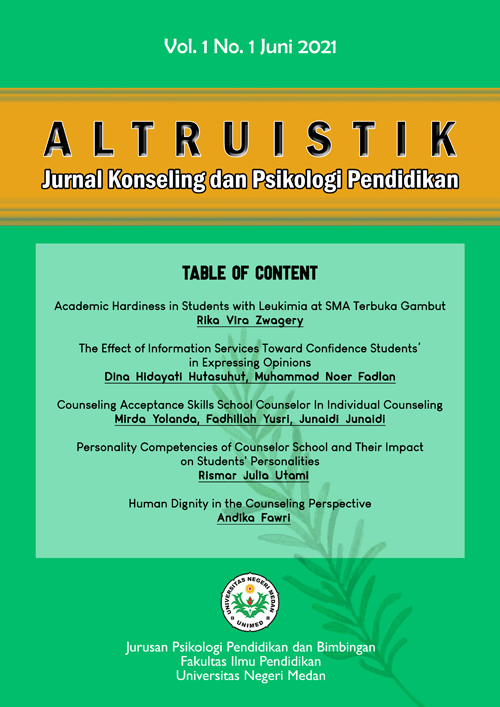Counseling Acceptance Skills School Counselor In Individual Counseling
DOI:
https://doi.org/10.24114/altruistik.v1i1.25344Keywords:
Acceptance Skills, Teacher, Guidance and CounselingAbstract
The purpose of this study is that researchers want to look at counselee acceptance skills in individual counseling by guidance and counseling teachers in MTsN 10 Agam. This type of research is descriptive qualitative field research. The key informants of this study were 1 guidance and counseling teacher plus a supporting informant of 7 students who had participated in individual counseling using the snowball method, which is a method for identifying, selecting and taking samples in a network or continuous chain of relationships. The information obtained will be developed to the point of saturation so that the longer the more information obtained. Based on the results of research and discussion it can be concluded that as a strategy for counselee acceptance skills by counseling teachers in individual counseling, counseling teachers assume counselee is the closest person, can accept counselees openly, guiding sincerely or voluntarily, sincerity, and loving, keep secrets counselee, not discriminating counselee, and love counseling.References
Departemen Agama Republik Indonesia. (1989). Alquran dan Terjemahnya. Gema Risalah Press.
Gunawan, I. (2014). Metode Penelitian Kualitatif Teori Dan Praktik. Bumi Aksara.
Hanurawan, F. (2016). Metode Penelitian Kualitatif untuk Ilmu Psikologi. Raja Grafindo Persada.
Mappiare, A. T. A. (2008). Pengantar Konseling Dan Psikoterapi. Raja Grafindo Persada.
Margono. (2007). Metodologi Penelitian Pendidikan. Rineka Cipta.
Prayitno. (2014). L.1 “ L.9. UNP Press.
Quthb, S. (2001). Tafsir Fi Zhilalil Qur™an Jilid 12. Gema Insani.
Suyanto, B., & Sutinah. (2005). Metode Penelitian Sosial; Berbagai Alternative Pendekatan. Kencana Prenada Media Group.
Taufik. (2012). Teknik Dan Laboratorium Konseling. UNP Press.
Willis, S. S. (2011). Konseling Individual (Teori dan Praktik). Alfabeta.
Yusri, F. (2019). Penguasaan Kompetensi Konselor Mahasiswa Peserta Program Pengalaman Lapangan (PPL) Prodi Bimbingan Konseling IAIN Bukittinggi. Jurnal Al-Taujih, 5(2), 183“195.
Downloads
Published
Issue
Section
License
Copyright (c) 2021 Mirda Yolanda, Fadhillah Yusri, Junaidi

This work is licensed under a Creative Commons Attribution-ShareAlike 4.0 International License.
Authors published in this journal agree to the following terms:
- The copyright of each article is retained by the author (s).
- The author grants the journal the first publication rights with the work simultaneously licensed under the Creative Commons Attribution License, allowing others to share the work with an acknowledgment of authorship and the initial publication in this journal.
- Authors may enter into separate additional contractual agreements for the non-exclusive distribution of published journal versions of the work (for example, posting them to institutional repositories or publishing them in a book), with acknowledgment of their initial publication in this journal.
- Authors are permitted and encouraged to post their work online (For example in the Institutional Repository or on their website) before and during the submission process, as this can lead to productive exchanges, as well as earlier and larger citations of published work.
- Articles and all related material published are distributed under a Creative Commons Attribution-ShareAlike 4.0 International License.
All writing in this journal is the sole responsibility of the author. Altruistik provides open access to anyone so that the information and findings in these articles are useful for everyone. Altruistik can be accessed and downloaded for free, free of charge, following the creative commons license.
License
ALTRUISTIK : Jurnal Konseling dan Psikologi Pendidikan is licensed under a Creative Commons Attribution-ShareAlike 4.0 International License.
You are free to :
Share — copy and redistribute the material in any medium or format
Adapt — remix, transform, and build upon the material for any purpose, even commercially
Under the following terms :
Attribution — You must give appropriate credit, provide a link to the license, and indicate if changes were made. You may do so in any reasonable manner, but not in any way that suggests the licensor endorses you or your use.
ShareAlike — If you remix, transform, or build upon the material, you must distribute your contributions under the same license as the original
No additional restrictions — You may not apply legal terms or technological measures that legally restrict others from doing anything the license permits


